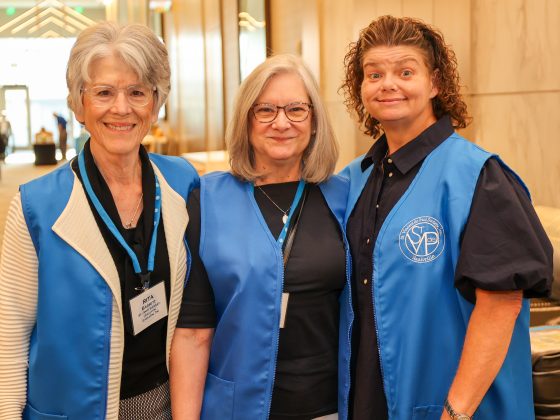In our works of charity, we come to know many neighbors whose circumstances seem so overwhelming that they begin to overwhelm us, too. It weighs on us, and we begin to suffer from what some call “compassion fatigue,” a sort of despair that perhaps what we do is simply not enough.
Our Rule reminds us that “in the poor [we] see the suffering Christ.” [Rule, Part I, 1.8] If we stop right there, it’s no wonder we despair. Yet every week at Mass, as we ponder the crucified Christ, there above the altar, we find peace in the reassurance of His great promise. On the cross, Jesus suffered unimaginably. Our very word in the English language for unbearable pain – excruciating – comes from the Latin ex cruce meaning “from the cross.” Yet to meditate upon that image brings us not sadness but joy; not despair, but hope.
That is because the faithful see the cross with hope-tainted eyes. We know Christ’s story does not end on that cross, and because of that, neither does ours. The cross is suffering, yes, but it is also redemption, it is also glory, it is also hope.
So, as we are called to see the suffering Christ in the neighbor, we also are called to see Him with the same hope-tainted eyes with which we gaze upon the crucifix. Both the neighbor’s troubles and our own will surely pass, and there is never a time that we should not, as Blessed Frédéric’s father advised him during a time of great sadness, “Gaudete in Domino semper.” (Rejoice in God always.) [Letter 160, to Laller, 1837]
To be sure, it is important to share the tears of the neighbor, but not without also sharing the hope of Christ. We can express our sympathy in no more sincere way than to share a tear, to bear with us part of the sadness, stress, or sometimes even anger that the neighbor may be feeling. This is, as St. Vincent once explained, “an act of love.” [CCD XII:221]
But to share only the despair is not our calling. “Help honors,” Blessed Frédéric wrote, “when it may become mutual.” [O’Meara, 229]
Vincentians serve in hope. Not merely the hope of paying a bill, because there always will be another bill. We serve in the eternal hope, “the great hope that cannot be destroyed,” and we “can always continue to hope, even if … there seems to be nothing left to hope for.” [Spe salvi, 35]
In suffering there is redemption, in the neighbor there is God, and in hope there is joy enough to share.
Contemplate
Why do I find it difficult to “rejoice in God always”?




Beautiful words and spot on. Our conference has been helping a single woman for three years who has lived within our parish boundaries. Granted she’s made some bad decisions as we all can do, but the “compassion fatigue” has been an increasingly big issue as time has gone on within our conference of 14. Our conference here in Milwaukee has set a goal of getting at least one neighbor back on their feet annually. This past Sunday this woman unexpectedly took the bus across town from a Motel 6 where she and her male companion have been staying while they seek an apartment after being evicted, to join my wife and I for Mass. The homily as it turned out was about compassion and care for the less fortunate in our society and were we up to Christ’s calling to follow his footsteps. This as she sat with us and our pastor being totally oblivious as to who she was. His message reinforced us and the five other Vincentions present at that Mass and was a call up to an already giving parish of elderly parishioners who support us. This neighbor is not the first long time neighbor in need of constant help nor will she be the last, but we have found that God is definitely working with us in so many ways. “If God is with us, who can stand against us”. Sometimes caring can be a long issue as we have found out, but you can’t celebrate with the neighbor when they finally succeed unless you’ve suffered with them. This past Monday seven of our conference members helped her and her partner move out of that motel to an apartment they were lucky enough to secure through her calling all over the city. They have no vehicle and barely enough for bus fare. She is not Catholic but wishes for her and her partner to join us at Mass when she is finally settled in to their new apartment. I told her she could someday become an advocate for the poor after going through times so difficult that she contemplated suicide. She agreed and hopes to be able to do that. God indeed whispers to us often. We simply need to listen.